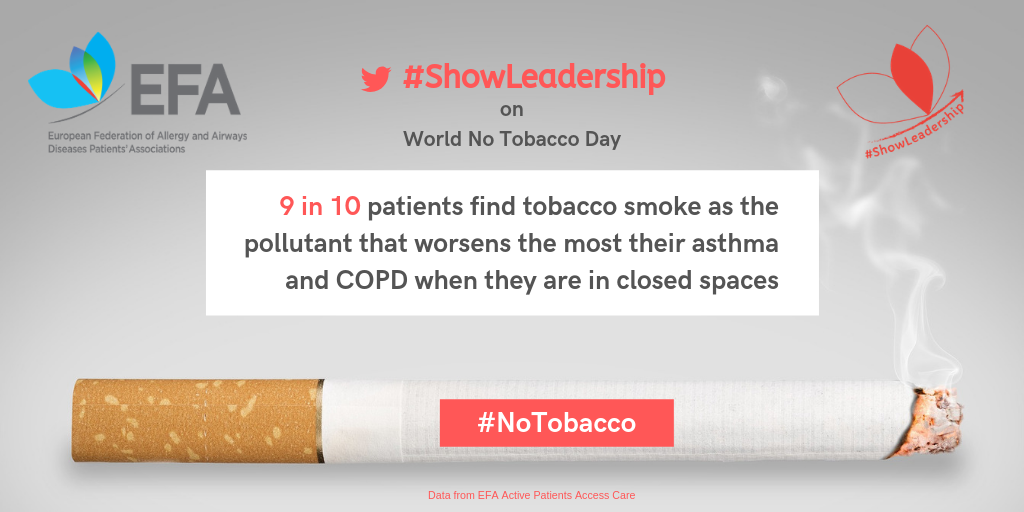On May 31st we celebrated Word No Tobacco Day with a focus on “tobacco and lung health”. At EFA we emphasised the negative effects of tobacco and smoking, disseminating new data on asthma and COPD patients’ perceptions and use of tobacco. We also celebrated the award that the WHO European Region granted to our Dutch Member, Longfonds, a distinguished recognition to their national and joint initiative for a Tobacco Free Generation.
Organised by the World Health Organisation (WHO), No Tobacco Day serves as platform to increase awareness on the negative impact tobacco and smoking have on people’s health.
It further puts a call to action, advocating for effective policies to reduce tobacco consumption and engaging stakeholders across multiple sectors in the fight for tobacco control.
Tobacco remains the deadliest preventable source of disease
Mortality statistics still show that tobacco is the deadliest preventable source of disease. The WHO has recognised 69 carcinogens within the more than 7,000 toxic chemicals that can be found in tobacco smoke. Every year more than 7 million people die due to first- or second-hand tobacco smoke.
In Europe, diseases related to tobacco consumption are also the most prevalent cause of death. Around 16 % of all deaths in adults over 30 years old are due to tobacco consumption and related diseases such as asthma, COPD, tuberculosis, cardiovascular disease or cancer.
EFA disseminates new patient centered data on tobacco
To emphasiswe the highly negative effects of tobacco and smoking, on World No Tobacco Day we disseminated evidence from our new EFA Active Patients Access Care Survey. The study is based on personal interviews with asthma and COPD patients in seven European countries and shows among others that tobacco is causing and exacerbating symptoms of respiratory disease.

One of the findings is that 9 in 10 patients find tobacco smoke as the pollutant that worsens the most their asthma and COPD when they are in closed spaces, and more than 90 % think stopping smoking and second hand smoke would improve their health condition.
#ShowLeadership to prevent exposure to second-hand smoke and support cessation treatment
At EFA, we are asking EU policy-makers to Show Leadership for better policies on smoke free places, preventing people from being exposed to tobacco smoke. Second-hand smoke causes an estimated 884,000 yearly premature deaths worldwide and, unfortunately, around 25 % of EU citizens are still exposed to tobacco smoke at work and in public spaces.
As only half of COPD patients that participated in our survey declared to be on smoking cessation, we are further calling for more policy support to have effective access to cessation treatment and to programmes helping to quit smoking.
As a way of combating smoking and tobacco use, at EFA we welcome the draft act by the European Commission Directorate General on Internal Market, Industry, Entrepreneurship and SMEs (DG Grow) on prohibiting the distribution of tobacco products in automatic distribution machines.
Congratulations to Dutch member Longfonds for winning the WHO European Region Award
Also this year, WHO honoured outstanding initiatives and campaigns aiming at combatting tobacco use. At EFA we were happy to see that an initiative co-run by EFA Dutch member Longfonds has been awarded: The Dutch Alliance for a Smoke-Free Society, “Nederland Rookvrij” which is active to fight smoking since 2015, won the WHO European Region Award 2019 for their campaign to have a tobacco free generation in 2040. Congratulations!

During the award ceremony in Brussels, WHO Representative to the European Union Leen Meulenbergs and Head of cabinet of the European Commissioner for Health and Food safety Arūnas Vinčiūnas stressed the highly negative impacts tobacco has on our health and highlighted the importance of initiatives such as “Nederland Rookvrij”.
Dr Filippos Filippidis from the European Respiratory Society (ERS) Standing Committee on Tobacco Control further emphasised, with a view to new tobacco products, that there is no “less harmful” way of smoking, referring also to the ERS position on tobacco harm reduction.